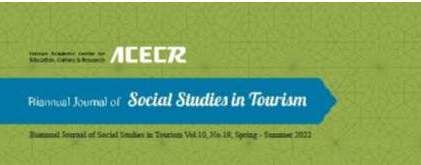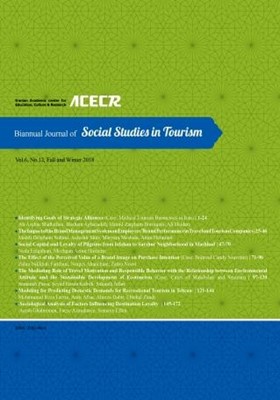The Impact of the Brand Management System on Employees’ Brand Performance in Travel and Tourism Companies
Subject Areas :1 * , Ardeshir Shiri 2 , Maryam Mesbahi 3 , Amin Hemmati 4
1 -
2 -
3 -
4 -
Keywords: brand management system brand identity brand loyalty brand performance brand commitment ,
Abstract :
Given the increasing level of competition among service companies, the role and the importance of intangible assets have increased. A brand is an intangible asset that is the most important factor in distinguishing a company and creating a competitive advantage for it. In the competitive environment of the tourism industry, maintaining and developing the market share result from the brand performance. Since the role of staff is significant in transferring the company’s brand contracts to customers (in service companies), this research tried to understand why the brand management system was important. It also tried to empirically investigate the effect of the brand management system on brand performance at the employee level, and the mediation effects of brand identity, brand commitment, and brand loyalty. The statistical population of this research included employees of travel and tourism companies in Tehran. To get a sample size, the study used available sampling and Cochran’s formula. This is an applied research, and data analysis is descriptive and correlational. To analyze the data of the questionnaire, the study used confirmatory factor analysis and structural equation model. The results showed that the brand management system had no direct effect on the brand performance at the employee level. However, the brand management system indirectly influenced brand performance through brand identity, brand commitment, and brand loyalty.
آهنگران، جعفر و اصلانی، رضا. (1396). «تأثیر عناصر مشارکت برند بر رضایت و وفاداری مشتریان رستوران¬های زنجیره¬ای شهر تهران». دوفصلنامه مطالعات اجتماعی گردشگری، 5(9)، 123-97.
ابراهیمی¬نژاد، مهدی؛ دهقانی سلطانی، مهدی؛ فارسی¬زاده، حسین و همتی، امین. (1396). «تأثیر برندسازی داخلی بر عملکرد برند در صنعت هتلداری (مورد مطالعه: هتل¬های بین¬المللی لاله و پارسیان استقلال در شهر تهران)». فصلنامه گردشگری و توسعه، 3(3)، 99-80.
پروین محبی، ناعمه؛ خوراکیان، علیرضا و فراحی، محمد مهدی. (1396). «اثر کیفیت درک شده خدمات، رضایت و اعتماد گردشگران بر استفاده مجدد از خدمات درمانی در بیمارستان¬ها و مراکز درمانی شهر مشهد». دوفصلنامه مطالعات اجتماعی گردشگری، 5(9)، 27-1.
دهدشتی شاهرخ، زهره و کهیاری حقیقت، امین (1393). «تأثیر ارزش ویژه برند صنعتی بر عملکرد برند از دیدگاه¬های اعضای مرکز خرید (مورد مطالعه: شرکت¬های تولیدکننده لوازم خانگی)». فصلنامه مدیریت بازرگانی، 6(3)، 496-475.
دهقانی سلطانی، مهدی؛ شیری، اردشیر؛ فرجی، الهام و فارسی¬زاده، حسین. (1396). «تأثیر هوش هیجانی بر عملکرد کارکنان در صنعت هتلداری: نقش میانجی استراتژی¬های بازیگری و فرسودگی هیجانی». فصلنامه مطالعات مدیریت گردشگری، 12(37)، 94-71.
سازمان میراث فرهنگی و صنایع گردشگری. (1396).
سرمد، زهره؛ بازرگان، عباس و حجازي، الهه. (1395). روش¬هاي تحقيق در علوم رفتاري. تهران: آگاه.
سلطانی، مرتضی؛ نبی¬زاده مامانی، الناز و مزینانی، امیرحسین. (1395). «طراحی و تبیین مدل مکانیزم¬ها، آثار و پیامد برندسازی داخلی (مورد مطالعه: گروه صنعتی سدید)». فصلنامه تحقیقات بازاریابی نوین، 2(21)، 152-133.
عزیزی، شهریار و اثناعشری، مسعود. (1391). «برندسازی داخلی و عملکرد برند در بانک: نقش تعدیلگر جو رقابتی و رضایت شغلی». فصلنامه پژوهش¬های مدیریت در ایران، 17(3)، 17-1.
عزیزی، شهریار؛ جمالی، شهرام و صناعی، ایمان. (1391). «ارائه مدل عوامل موثر بر عملکرد کارکنان در مورد برند در صنعت بانکداری (مطالعه موردی: بانک کشاورزی)». فصلنامه مدیریت بازرگانی، 4(11)، 104-89.
ملکی مین¬باش رزگاه، مرتضی؛ فیض، داود و همتی، مریم. (1395). «توسعه مدل عملکرد برند سازمان بر مبنای بازاریابی داخلی و برندینگ داخلی». فصلنامه پژوهش¬های منابع سازمانی، 6(2)، 194-169.
میرزاده، محمدرضا. (1390). تجزیه و تحلیل آماری با نرم¬افزار SPSS. تهران: تایچاز.
نامی ملایی، شهرام؛ اسلامی، حسین و علوی راد، عباس. (1394). «بررسی عوامل کلیدی موفقیت برندسازی داخلی در بانک ملت (مورد مطالعه: شعب بانک ملت استان تهران)». کنفرانس بین¬المللی مدیریت در قرن 21، تهران.
Baumgarth, C. (2010). "Living the brand: brand orientation in the business-to-business sector". European Journal of Marketing, 44(5), 653-671.
Chang, Y; Wang, X. & Amett, D.B. (2018). "Enhancing firm performance: The role of brand orientation in business-to-business marketing". Industrial Marketing Management, 72(1), 17- 25.
Drake, S.M; Gulman, M.J. & Roberts, S.M. (2005). Light Their Fire, Dearborn, Chicago, IL. Fatma, M; Khan, I. & Rahman, Z. (2016). "How does corporate association influence consumer brand loyalty? Mediating role of brand identification". Journal of Product & Brand Management, 25(7), 629-641.
Foroudi, P. (2018). "Influence of brand signature, brand awareness, brand attitude, brand reputation on hotel industry’s brand performance". International Journal of Hospitality Management, 31(1), 1-15.
Högström, C; Gustafsson, A. & Tronvoll, B. (2015). "Strategic brand management: Archetypes for managing brands through paradoxes". Journal of Business Research, 68(2), 391-404.
Hur, W.M; Ahh, K.H. & Kim, M. (2011). "Building brand loyalty through managing brand community commitment". Management Decision, 49(7), 1194-1213.
Inderst, R. (2013). "Prudence as a competitive advantage: On the effects of competition on banks' risk-taking incentives". European Economic Review, 60(1), 127-143.
Lee, J; Park, S.Y; Baek, I. & Lee, C. (2008). "The impact of the brand management system on brand performance in B2B and B2C environments". Industrial Marketing Management, 37(1), 848-855.
Li, C; Guo, S; Cao, L. & Li, J. (2018). "Digital enablement and its role in internal branding: A case study of HUANYI travel agency". Industrial Marketing Management, 72(1), 152-160. Liu, G; Ko, W.W. & Chapleo, C. (2017). "Managing employee attention and internal branding". Journal of Business Research, 79(1), 1-11.
Madhavaram, S. & Hunt, S.D. (2008). "The service dominant logic and a hierarchy of operant resources: developing masterful operant resources and implications for marketing strategy". Journal of The Academy of Marketing Science, 36(1), 67-82.
Mogaji, E. & Danbury, A. (2017). "Making the brand appealing: advertising strategies and consumers’ attitude towards UK retail bank brands". Journal of Product & Brand Management, 26(6), 531-544.
Papasolomou, O. & Vrontis, D. (2006). "Building corporate branding through internal marketing: the case of the UK retail bank industry". Journal of Product & Brand Management, 15(1), 37- 47.
Pinar, M., Girard, T., Trapp, P. & Eser, Z. (2016). "Service branding triangle: Examining the triadic service brand promise for creating a strong brand in bank in banking industry". International Journal of Bank Marketing, 34(4), 529-549.
Pritchard, M.P; Havitz, M.E. & Howard, D. (1999). "Analyzing the commitment-loyalty link in service contexts". Journal of The Academy of Marketing Science, 27(3), 333-48.
Punjaisri, K; Evanschitzky, H. & Wilson, A. (2009). "Internal branding: An enabler of employees' brand-supporting behaviors". Journal of Service Management, 20(2), 209-226.
Punjaisri, K. & Wilson, A. (2007). "The role of internal branding in the delivery of employee brand promise". Journal of Brand Management, 15(1), 57-70.
Rosengren, S. & Bondesson, N. (2017). "How organizational identification among retail employees is affected by advertising". Journal of Retailing and Consumer Services, 38(1), 204- 209.
Saleem, F.Z. & Iglesias, O. (2016). "Mapping the domain of the fragmented field of internal branding". Journal of Product & Brand Management, 25(1), 43-57.
Santos-Vijande, M.L; del Río-Lanza, A.B; Suárez-Álvarez, L. & Díaz-Martín, A.M. (2013). "The brand management system and service firm competitiveness". Journal of Business Research, 66(2), 148-157.
Schemidt, H.J; Mason, R; Steenkamp, P. & Mugobo, V. (2017). "Does brand orientation contribute to retailers’ success? An empirical study in the South African market". Journal of Retailing and Consumer Services, 38(1), 210-222.
Terglav, K; Ruzzier, M.K. & Kase, R. (2016). "Internal branding process: Exploring the role of mediators in top management's leadership–commitment relationship". International Journal of Hospitality Management, 54(1), 1-11.
Wang, C.H. (2014). "How relational capital mediates the effect of corporate reputation on competitive advantage: Evidence from Taiwan high-tech industry". Technological Forecasting and Social Change, 82(1), 167-176.
Wangenheim, F; Evanschitzky, H. & Wunderlich, M. (2007). "The employee-customer satisfaction link: does it hold for all employee groups?". Journal of Business Research, 60(7), 690-697.
Xiong, L. & King, C. (2018). "Too much of a good thing? Examining how proactive personality affects employee brand performance under formal and informal organizational support" International Journal of H`ospitality Management, 68(1), 12-22.
Zhao, W; Sun, R. & Kakuda, N. (2017). "Institutionalized place branding strategy, interfirm trust, and place branding performance: Evidence from China". Journal of Business Research, 78(1), 261-267.

